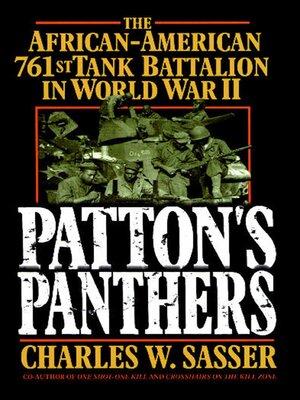Patton's Panthers
ebook ∣ The African-American 761st Tank Battalion In World War II
By Charles W. Sasser

Sign up to save your library
With an OverDrive account, you can save your favorite libraries for at-a-glance information about availability. Find out more about OverDrive accounts.
Find this title in Libby, the library reading app by OverDrive.



Search for a digital library with this title
Title found at these libraries:
| Library Name | Distance |
|---|---|
| Loading... |
On the battlefields of World War II, the men of the African American 761st Tank Battalion under General Patton broke through enemy lines with the same courage with which they broke down the racist limitations set upon them by others—proving themselves as tough, reliable, and determined to fight as any tank unit in combat.
Beginning in November 1944, the 761st Tank Battalion engaged the enemy for 183 straight days, spearheading many of General Patton's offensives at the Battle of the Bulge and in six European countries. No other unit fought for so long and so hard without respite. The 761st defeated more than 6,000 enemy soldiers, captured thirty towns, liberated Jews from concentration camps—and made history as the first African American armored unit to enter the war.
This is the true story of the Black Panthers, who proudly lived up to their motto (Come Out Fighting) and paved the way for African Americans in the U.S. military—while battling against the skepticism and racism of the very people they fought for.
Beginning in November 1944, the 761st Tank Battalion engaged the enemy for 183 straight days, spearheading many of General Patton's offensives at the Battle of the Bulge and in six European countries. No other unit fought for so long and so hard without respite. The 761st defeated more than 6,000 enemy soldiers, captured thirty towns, liberated Jews from concentration camps—and made history as the first African American armored unit to enter the war.
This is the true story of the Black Panthers, who proudly lived up to their motto (Come Out Fighting) and paved the way for African Americans in the U.S. military—while battling against the skepticism and racism of the very people they fought for.







